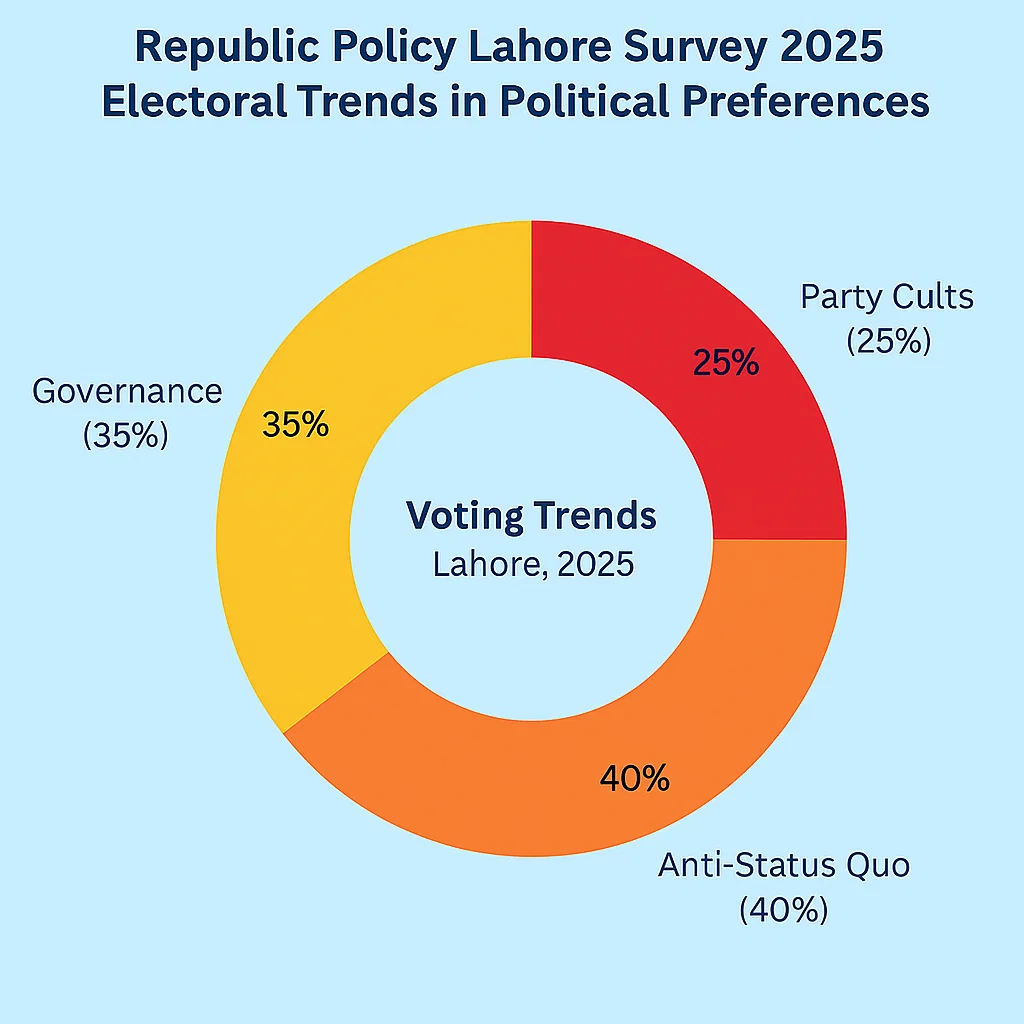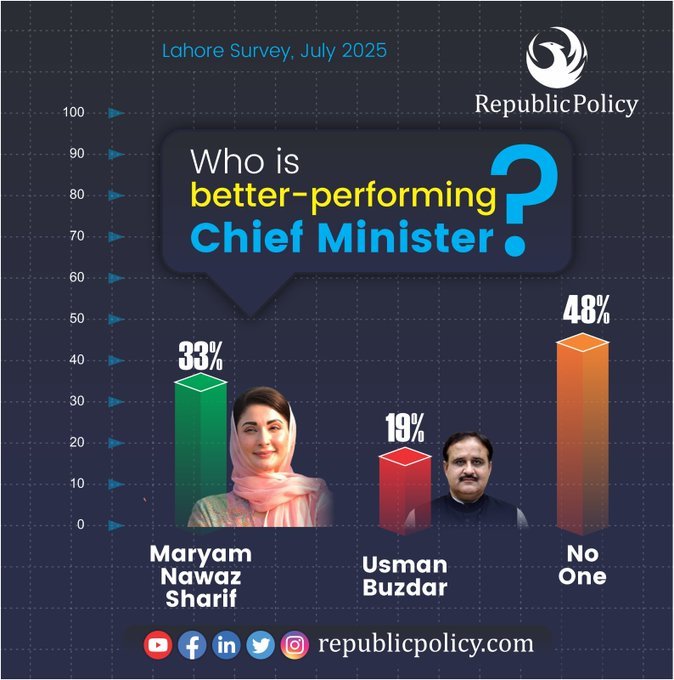Team Republic Policy
Please, read the complete report before understanding this part of Lahore July survey:
The Republic Policy Think Tank’s July 2025 consolidated Lahore survey offers an important lens into the political consciousness of one of Pakistan’s most politically active cities. While the central question asked respondents which political party they would vote for if elections were held today, nine supplementary questions were designed to unpack the broader dynamics of governance perception and party performance. One such question — “Who is the better performing Chief Minister of Punjab, Maryam Nawaz or Usman Buzdar?” — is not just a comparative exercise in political popularity, but a measure of public trust in leadership, delivery, and governance under two different party-led administrations. The findings reveal more than just numbers; they speak to the underlying currents shaping voter expectations and political legitimacy in Punjab’s heartland.
Follow Republic Policy Website
Republic Policy’s rationale for asking this question was rooted in the principle that performance evaluation must be comparative. In Punjab’s case, comparisons cannot be drawn meaningfully with short-term or un-elected Chief Ministers like Mohsin Naqvi, Pervez Elahi, or Hamza Shehbaz, two of whom served less than a year. Instead, Maryam Nawaz and Usman Buzdar — representing the Pakistan Muslim League-Nawaz (PML-N) and Pakistan Tehreek-e-Insaf (PTI) respectively — are seen as genuine representatives of two rival political visions with adequate tenure for public scrutiny. This makes the comparison both politically relevant and methodologically sound, allowing voters to assess leadership under relatively stable administrative conditions.
Follow Republic Policy YouTube
In Lahore’s urban context, Maryam Nawaz enjoys a distinctive advantage in terms of institutional and political backing. She governs with the full weight of the provincial and federal governments behind her, meaning she has easier access to bureaucratic machinery and faces minimal institutional resistance. The establishment’s goodwill, coupled with the absence of an effective opposition in the Punjab Assembly, grants her considerable room to implement her agenda. In contrast, Usman Buzdar operated in a more adversarial political climate, where institutional alignment was less favourable, political opposition was stronger, and bureaucratic support was far less dependable. This asymmetry in political circumstances significantly influences the way performance is perceived by the electorate.
Follow Republic Policy Twitter
The survey results themselves are revealing: 33% of respondents rated Maryam Nawaz as the better performing Chief Minister, 19% preferred Usman Buzdar, and a striking 48% declared that neither leader had performed satisfactorily. These figures underscore a dual reality. First, Maryam’s advantage is clear, but far from overwhelming. Second, the largest single segment of respondents — nearly half — remain unconvinced by either leader’s performance, signalling widespread dissatisfaction with governance in Punjab’s largest city. This indicates a growing gap between public expectations and the delivery capacity of mainstream political leadership.
Follow Republic Policy Facebook
Interestingly, some PTI supporters acknowledged Maryam Nawaz’s performance, demonstrating that her governance initiatives have penetrated beyond her party’s base. However, the 48% who rejected her performance were predominantly PTI-aligned voters, reflecting partisan loyalty and resistance to PML-N’s political narrative. Lahore’s urban electorate, unlike rural constituencies, places a premium on visible service delivery, municipal efficiency, and governance reforms. According to Republic Policy’s feedback from field research, Maryam’s popularity for governance in rural Punjab is significantly weaker, suggesting that her urban approval rests on a few targeted initiatives rather than widespread reform.
The initiatives credited to Maryam Nawaz’s administration in Lahore include the “Saaf Suthra Punjab” cleanliness campaign, improvements in municipal services, the strengthening of the Crime Control Department (CCD), and actions through the Punjab Enforcement and Regulatory Authority (PERA). Each of these projects aligns with urban voters’ priorities — visible cleanliness, improved law enforcement, and regulatory oversight in administration. Yet, the limited scope of these reforms means her administration has not yet translated its institutional advantages into overwhelming public approval, a gap that could become politically significant in the next electoral cycle.
Follow Republic Policy Website
For Usman Buzdar, the challenge is even more acute. His support base among Lahorites consists primarily of PTI’s hardcore loyalists, rather than voters swayed by his governance record. During his tenure, Lahore suffered from visible municipal neglect, infrastructure delays, and limited public service delivery. This legacy has left a lasting impression, making it difficult for him to compete in a head-to-head performance evaluation against Maryam Nawaz, despite PTI’s enduring popularity as an anti-establishment force in urban Punjab. The survey findings suggest that, in terms of municipal governance, Buzdar’s tenure did little to address the urban service delivery expectations that dominate Lahore’s political culture.
Follow Republic Policy YouTube
This Analysis is essential to understand this report.

From a political strategy perspective, the comparative evaluation between Maryam Nawaz and Usman Buzdar reveals deeper truths about governance perception. For Maryam, the risk lies in complacency; the absence of a strong opposition in the Assembly does not shield her from the public’s critical eye. In fact, the survey’s 48% “none” response is a warning that governance legitimacy in Punjab cannot be secured solely through institutional advantage or media visibility — it requires sustained, equitable, and transparent service delivery. For Buzdar, the takeaway is that partisan loyalty alone cannot overcome a poor governance record in a metropolis as politically discerning as Lahore.
Follow Republic Policy Twitter
In the broader context of Punjab politics, these findings also challenge the narrative that Lahore is a “PML-N fortress.” While Maryam maintains a lead over Buzdar, the size of the disillusioned segment suggests that neither party can take the city for granted. This creates potential opportunities for alternative political forces or independent candidates who can credibly present themselves as governance-focused leaders without the baggage of partisan failure. In an environment where voter trust is fragile, governance credibility becomes the most valuable political currency.
Follow Republic Policy Facebook
Republic Policy’s field analysis also suggests that the “none” category in the survey is more than just an expression of disapproval; it is an active political statement. These voters are not merely undecided; they are consciously rejecting both major parties’ governance models. This sentiment, if sustained, could significantly alter Lahore’s political calculus, especially in tightly contested constituencies where turnout and voter mobilisation are decisive. For Maryam, reducing this disillusionment requires deep, structural governance reforms. For Buzdar and PTI, it demands a reimagining of urban policy priorities beyond rhetoric.
Ultimately, the July 2025 Lahore survey does more than compare two Chief Ministers; it measures the health of Punjab’s democratic governance. The fact that nearly half of Lahore’s respondents remain unconvinced by either leader points to a deeper political malaise — one rooted in the persistent gap between electoral promises and policy outcomes. For Lahore, a city that has historically shaped national political narratives, this disillusionment carries implications far beyond provincial politics. It is a reminder that in a competitive political environment, governance is not just a matter of survival; it is the key to legitimacy.
Please, read Detailed Report of RP Lahore Survey to understand it:
















